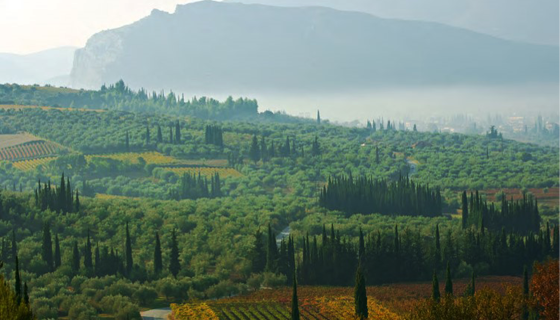The quality and sophistication of today’s Greek wines is so far a delightful insider secret in wine circles. So how is word spread about any new generation of gifted wine producers? The usual way is for a generic promotional body to organise tastings in key markets and, ideally, trips to the source for opinion-formers.
I am thrilled to report that, along with the US, the UK where I’m based is a key market for wine. From September to July the wine-trade diary overseen by the trade body the Wine and Spirit Trade Association is crammed with tastings, up to four or more each day.
The government-backed generic organisation Wines of Greece has been hosting tastings of Greek wine in London and New York, as they should. But my fellow wine writers have found them hugely frustrating, and almost worthless. An example: last August a tasting was organised in London of the wines of Attica, Greece’s biggest wine region, where terrible fires have been raging. August, when so many are on holiday and temperatures likely to peak, making wine service difficult, is anyway a most unusual month for a successful wine event.
But that wasn’t the main problem. A note at the bottom of the invitation warned: ‘Please note that due to extremely strict Greek/EU funding regulations, the wine labels will be covered for this event and the wine names will not be listed in the tasting booklet.’
Cue outraged wine writers on Twitter. If we can’t recommend specific wines to our readers, there is not much point in devoting hours to a tasting. And it’s also difficult to see any point to such an exercise for individual wine producers.
But the Greek authorities, unlike any others I have come across, have decided that if they give any funds to a wine promotional activity, that activity has to be strictly for the country or region. Any identification of an individual wine, they have decreed, could be interpreted as promoting a brand. Hence the Attica blind (in perpetuity) tasting. And apparently, when wine professionals are invited by Wines of Greece on an official trip, to the island of Santorini for example, any bottles opened for them have to be completely masked. What a logistical nightmare!
Sue Harris of Westbury Communications has been organising generic wine events in the UK for 30 years. She was involved with the Attica tasting last year, but has refused to repeat the exercise this year. ‘I like my campaigns to result in increased sales and exports’, she says. Instead, this year she got together with Sofia Perpera of the Greek Wine Federation, an independent, non-profit association of Greek wine exporters, and they plotted how to organise a truly effective showing of what Greece has to offer the modern wine drinker.
They approached individual producers they thought might be interested in co-operating in a tasting in the UK, asking for contributions on a sliding scale according to the size of the enterprise. They managed to rustle up enthusiasm on the part of 32 producers, with more keen to participate when they are no longer committed to any other generic effort.
So it was that on 26 June in the rather beautiful St John’s Church opposite Waterloo Station (built, appropriately enough, in the style described as Greek Revival) and on 28 June in Edinburgh’s Assembly Rooms, the air was thick with melodic Greek accents and the perfumes of no fewer than 30 indigenous Greek grape varieties.
Just like Portugal, another up-and-coming wine producer, Greece can boast a thrilling range of unique native grapes – more than 300 have so far been identified, far more than one would expect given that Greece produces less wine than, for example, the Republic of Moldova. The best-travelled of them so far is Santorini’s Assyrtiko, whose nervy white wines I devoted this article to last October. In fact, one might argue that Assyrtiko is to Greek grapes what the relatively well-travelled Touriga Nacional is to Portuguese grapes.
Because I have written here relatively recently about the delights of Assyrtiko, and because there were all of 170 wines on show at St John’s, I agreed with Julia, much more knowledgeable about Greek wine than me, that I would taste the reds and she would taste the whites. (The number of rosés is also increasing in Greece; see this recent wine of the week, for instance.)
Although the popular conception of Greece is of a hot, red-wine country, the first modern Greek wines to make an impact abroad have been white, generally from sea-cooled islands or higher elevations. But Greece’s red wines have been catching up fast.
Perhaps the most obvious red wine grape to resonate with current wine trends is Xinomavro, grown throughout northern Greece and particularly associated with Naoussa in the far north. The shorthand is that Xinomavro (meaning ‘acid black’) is a bit like the Nebbiolo of Barolo and Barbaresco fame. It shares with that fashionable variety a fairly light colour, marked acidity and tannin in youth and a rather haunting aroma. I love it.
Agiorgitiko (St George) is the most-planted red wine grape in Greece. It’s grown widely and is particularly associated with a wide range of fuller-bodied, ageworthy wines in the Nemea appellation in the north-east of the Peloponnese, at elevations up to 900 m (2,950 ft) – far higher than most red-wine vineyards in France or Italy. (Note the fog in the high hills of Nemea in the photo above.)
But there’s a sense in modern Greek viticulture that all these ambitious wine producers are revelling in discovering and promulgating much more obscure local grape varieties, which tend confusingly to have several local synonyms and different ways of spelling them. Among the grapes responsible for the wines I tasted at St John’s were the Liatiko and Kotsifali of Crete, Mandilaria (known as Mavrokoundoura on the island of Evia), Mouhtaro or Mouchtaro, pioneered by Muses Estate north-west of Athens, and Santorini’s Mavrotragano. Avgoustiatis, a name which may (or may not) be applied to other varieties that ripen as early as August, managed to produce a charming red on Samos. Mavrodaphne, long used to make sweet, strong reds, is now being harnessed for some fine dry reds, usually when grown at higher elevations.
If these reds share a characteristic, it is that with most of them you sense that they are grown in a very dry climate so have a certain, by no means unpleasant, earthy dustiness, but all of them are distinctly different, and distinctly Greek.
My thanks to Harris and Perpera for allowing us to see the labels.
Recommended Greek reds
With grape varieties in brackets where necessary. Retailers with a particularly interesting range of Greek wines are asterisked.
Thymiopoulos, Atma Xinomavro 2021 Macedonia 13%
£9.49 Waitrose
Boutari 2020 Naoussa 13% (Xinomavro)
£11.99 Aspris & Son*, £14.60 Epinoia*
Papagiannakos, Erythros 2019 Peloponnese 12.5% (Agiorgitiko, Cabernet Sauvignon)
£12.79 All About Wine, £12.95 N D John and many more
Oenops, Apla 2019 Greece (Xinomavro, Limniona, Mavroudi) 13%
£12.88 Lay & Wheeler
Thymiopoulos, Jeunes Vignes Xinomavro 2021 Macedonia 13%
£13.50 The Wine Society* and others
Diamantakis, Petali Liatiko 2019 Crete 13.2%
£13.95 NY Wines, £14 Woodwinters and others
Noema, Invicta 2019 Amyndeo 12% (Xinomavro)
£15.99 Averys, Laithwaite’s
Orealios Gaia, Nouvelle Epoque 2021 Mavrodaphne of Cephalonia 13%
£17.50 Maltby & Greek* (can be ordered)
Kir Yianni Kali Riza Xinomavro 2019 Amyndeo
£17.99 Virgin Wines
Spiropoulos 2019 Nemea 13.5% (Agiorgitiko)
£21 Amathus* (shipped post summer)
Vakakis, Pythagorean Tetractys Avgoustiatis 2021 Greece 13.5%
£21 Kudos Wines* and Ripponden Wine, £23.10 Somerset Wine Co
Costa Lazaridi, Château Julia Agiorgitiko 2020 Drama 13.5%
£23.60 Private Cellar
Santo Mavrotragano 2020 Cyclades 13.5%
£28.95 Aspris & Son*
Gaia Agiorgitiko 2020 Nemea 14.5%
£32.50 Epinoia*, £32.79 All About Wine and many more
For tasting notes, scores and suggested drink dates on thousands of Greek wines, see our tasting notes database, and especially but not exclusively Greek wines in London – reds. For more stockists, both UK and international, see Wine-searcher.com.














